How To Store Honey for Better Quality, Saving Money, & Helping Bees
Author: Anne Cowart | Editor: Omar Alonso
Review & Research: Jen Worst & Chris Miller
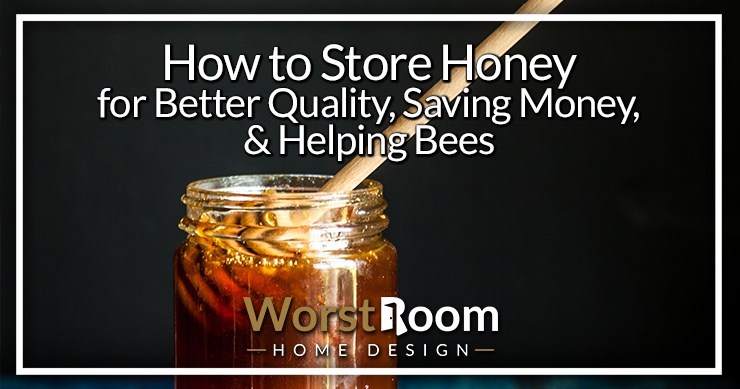
Have you ever heard somebody discussing how to store honey forever because honey doesn’t expire? It’s one of those things that sounds like a myth, how could it be possible?
Preserving honey correctly can allow it to keep indefinitely, but the key here is knowing how to store honey long term because if you don’t do it correctly, you’re going to end up wasting a lot of honey.
While honey can keep indefinitely, that doesn’t mean it will automatically keep forever because it still requires certain precautions be made.
Storing honey isn’t an overly difficult or complicated task, but you do need to take some things into consideration. Any long-term food storage has risks associated with it. Honey is easier to store than most foods, but it’s not fool-proof.
How Should Honey Be Stored? The 3 Main Considerations:
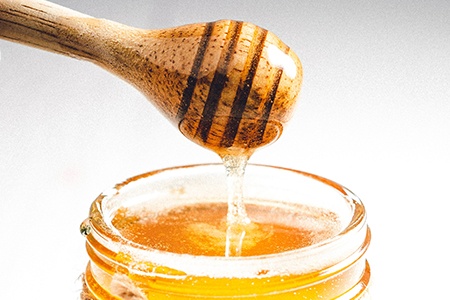
How much honey you want to store: Storing a few smaller containers of honey in the pantry is different than keeping a massive supply that you’ve harvested from your own bee hives.
We’ll assume that most people are looking to store a reasonable amount for their family to use, rather than going into the particulars of running a wholesale honey operation.
How long you want to store honey for: The longer that you plan on storing it for, the more perfect your methods need to be.
Honey will be fine for a stretch of time in less-than-ideal conditions without putting a second thought into it, but if you’re planning to store it for years and years, you’ll want to make sure you’re following the rest of these instructions.
What your local conditions are like: In some areas, the climate stays pretty good for honey preservation all year long. In other parts of the world, it can get very hot in the summer and very cold in the winter, so this swing in temperature is something to keep in mind.
If you have a particularly dry or a very humid climate, this is also something to be aware of when storing your honey.
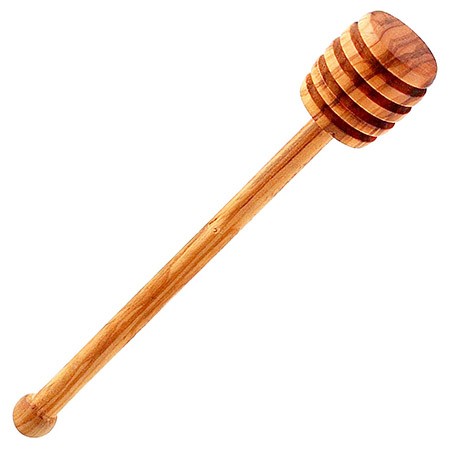
Now that we’ve laid the groundwork, let’s get into the details and what adjustments you might want to make, depending on where you land with the above considerations.
The Best Temperature For Storing Honey
You may not have total control over the temperature in your whole home. You could have a basement that gets very cold in the wintertime, or an attic that gets very warm in the summer.
The temperature in your home will vary throughout the year and sometimes even day-to-day. Drastic swings in temperature (either quickly or over the course of seasons) will eventually diminish the taste of your delicious liquid gold.
You can avoid this from happening by keeping your honey stored around 50 °F and aiming to keep it below 70 °F on the higher-end. That works out to about 10-20 °C, which is typically a bit cooler than room temperature for most homes.
This is ideal, but your honey should be just fine at room temperature too, as long as you have it in a good container and you’re avoiding those fluctuations.
Processed honey is more forgiving than unprocessed honey. Unprocessed honey may crystallize over time, but that’s nothing to worry about. It’s a normal process that can take place, and it doesn’t mean your honey has gone bad or lost any of its flavor or health benefits.
It’s better to be slightly off the recommended temperature than to have it swinging from one end of the spectrum to the other. Also, having your honey stored in an area that’s a little bit cooler is better than somewhere that’s a little bit hotter, and finally you don’t need to keep it in the fridge.
The Best Container for Storing Honey
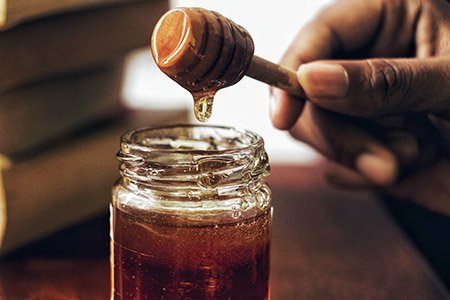
Your best bet is probably to keep the honey in whatever container it came in, but not necessarily.
If you’re buying from a smaller local producer, they might sell it in see-through jars or plastic containers. The best container for honey is something that’s air-tight, blocks out light, and is stable.
Ideally, a dark glass jar with a sealed lid will work great. Of course, if you’re actively eating the honey and using it, then whatever container it came in should be just fine.
Air tight isn’t as much of a concern for shorter-term storage. Even if it was air-tight, you would be breaking the seal every time you went to scoop out some honey.
If it’s honey you’re using soon (within a year or two), don’t worry about having a perfect air-tight seal on the container. If you’re storing it for a longer period of time, I recommend putting a greater priority on having an air-tight seal.
I like to avoid using plastic containers for long term honey storage. They’re probably just fine for shorter spans, but I don’t really trust plastics not to leech over the course of multiple years. Your mileage may vary, but I prefer to stick with glass, if for no other reason than to preserve flavor.
Other Conditions & Honey Storing Advice
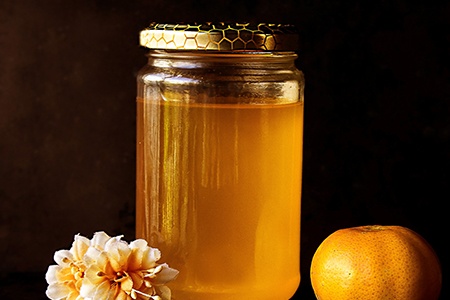
I recommend not storing your honey near a heater, a furnace, or a stove. While these areas may meet the temperature requirements most of the time, they also generate enough heat to harm your honey at other times. You don't want to bust the glass and end up having to clean honey out of your carpet either.
The most common problem when it comes to honey storage is keeping it stored on a shelf above the stove. Again, most of the day it’s just fine, but when you’re cooking up a storm below the honey, that is enough to move the temperature a few degrees and should be avoided as much as possible.
If you must do this, then at least have another layer of "insulation" below them like putting your jars on top of a cutting board or try to move them onto a shelf above your kitchen sink instead, where they can still be decorative. Another idea is store them near all of your different types of spoons you have hanging or in another jar, and add a honey dipper to the collection..
Why Do People Stockpile Honey?
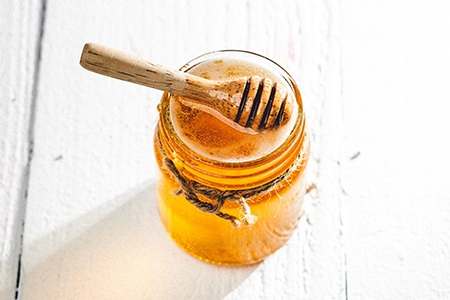
If you’re someone who usually keeps a small jar of honey in the pantry and that’s about it, all of this talk about storing honey for long periods of time might seem a bit odd.
Honey can be incredibly costly to purchase in smaller quantities from the grocery store. When you buy your honey from a farmer/beekeeper, you’re getting something that was made locally and you’ll usually get a much better price.
Granted, you’ll have to buy a larger quantity to make it worthwhile, but that’s exactly why it’s so practical - you save a fortune, and your honey will last you forever.
The Cost
It’s hard to understand having liters of honey if you’re in a household that rarely uses it, but for people who prefer honey in their tea and that bake various recipes with it, they’ll go through honey pretty quickly. Buying those tiny containers from the grocery store for $5-$10 at a time adds up very quickly.
The Quality
The honey you find in the grocery store is often a significantly lower grade, too. It comes from who-knows-where in the world, and there have even been instances where imported honey was revealed to contain all sorts of filler products.
Bees & The Environment
Buying honey from a local supplier is so important because it supports your local bee colonies, and the honey was made using the nectar of flowers and plans from your own local environment.
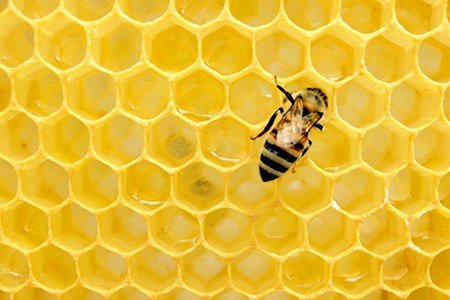
I think it’s important to care about the bee population of the entire world, any practically speaking, any honey you buy is going to put money into the hands of someone that’s caring for bees… but when you shop local, you’re having the smallest footprint on the environment, and you’re helping the bee colonies in your community.
Also, it’s almost a guarantee that the local producers are more mindful of sustainability and quality than some mega-corporation that makes enough to ship worldwide.
This last bit is more opinion-based, but no matter how you slice it, if you want the best honey and you want to (usually) pay a lot less for it than store-brand, look to your local producers. They know better than anyone the trouble that bee colonies are facing.
Beyond that, it also reduces the overall carbon footprint to grab local honey instead of something that’s been shipped over on a boat, then hauled around on trucks, etc.
Everyone has their own opinions and priorities when it comes to the environment, but we all have to work together to do what we can to help our bee friends, they’re a crucial part of our food system and their influence goes far beyond just honey.
That's How To Store Honey!
Now that you know how to store honey, you’ve probably realized how easy honey storage can be. Because storing honey is so easy, you may as well stock up, too.
Follow the simple instructions and guidelines that we’ve covered today and your honey will last as long as you need it to. It’s a dense source of calories, so it’s also not a bad idea to have some on hand in the event of an emergency.
You'll Also Enjoy:
- Types of Coffee Makers: Choosing Correctly and Why It Matters
- The Best Substitute for Laundry Detergent is Already In Your Home
- 14 Plants That Repel Spiders Indoors & Outdoors With Little Effort
- How to Secure a Sliding Glass Door: Easy Security Options
- How to Hide Exposed Pipes: Creative Ways to Cover & Conceal




